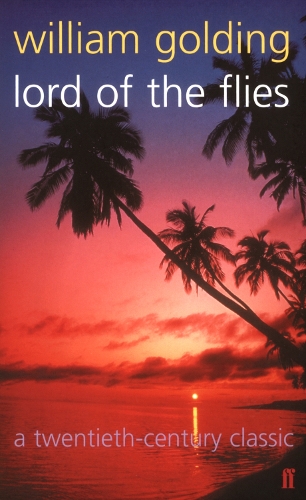
Lord of the Flies
(, Export - Airside ed)
Available Formats
Paperback, Main
Published: 1st December 2006
Hardback, Main - 70th anniversary hardback edition
Published: 4th February 2025
Paperback, Main
Published: 1st March 2022
Paperback, Education Edition
Published: 28th November 2013
Hardback, Main
Published: 3rd December 2024
Paperback, Main - Centenary Edition
Published: 11th August 2011
Publishing Details
Lord of the Flies
By (Author) William Golding
Faber & Faber
Faber & Faber
5th April 1999
Export - Airside ed
United Kingdom
Classifications
General
Fiction
823.914
Runner-up for The BBC Big Read Top 100 2003
Physical Properties
240
Width 111mm, Height 178mm, Spine 14mm
137g
Description
Originally published in 1954, William Golding's Lord of the Flies is one of the most disturbing and celebrated novels of modern times.A plane crashes on a desert island. The only survivors are a group of schoolboys. At first they revel in the freedom and celebrate the absence of grown-ups. Soon though, as the boys' fragile sense of order begins to collapse, their fears start to take on a sinister, primitive significance. Suddenly, the world of cricket, homework and adventure stories seems a long way away. The boys are faced with a more pressing reality - survival - and the appearance of a terrifying beast who haunts their dreams.
Author Bio
William Golding was born in Cornwall in 1911 and was educated at Marlborough Grammar School and at Brasenose College, Oxford. Before he became a schoolmaster he was an actor, a lecturer, a small-boat sailor and a musician. A now rare volume, Poems, appeared in 1934. In 1940 he joined the Royal Navy and saw action against battleships, submarines and aircraft. He was present at the sinking of the Bismarck. He finished the war as a Lieutenant in command of a rocket ship, which was off the French coast for the D-day invasion, and later at the island of Welcheren. After the war he returned to Bishop Wordsworth's School in Salisbury and was there when his first novel, Lord of the Flies, was published in 1954. He gave up teaching in 1961.Lord of the Flies was filmed by Peter Brook in 1963. Golding listed his hobbies as music, chess, sailing, archaeology and classical Greek (which he taught himself). Many of these subjects appear in his essay collections
